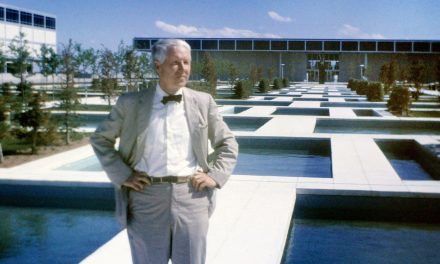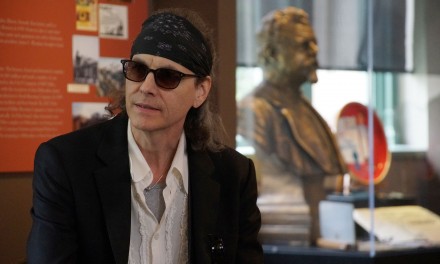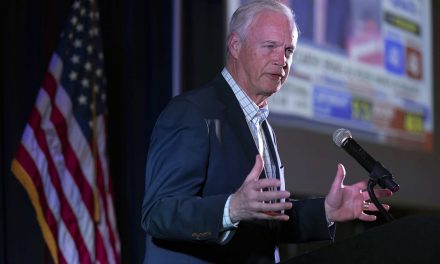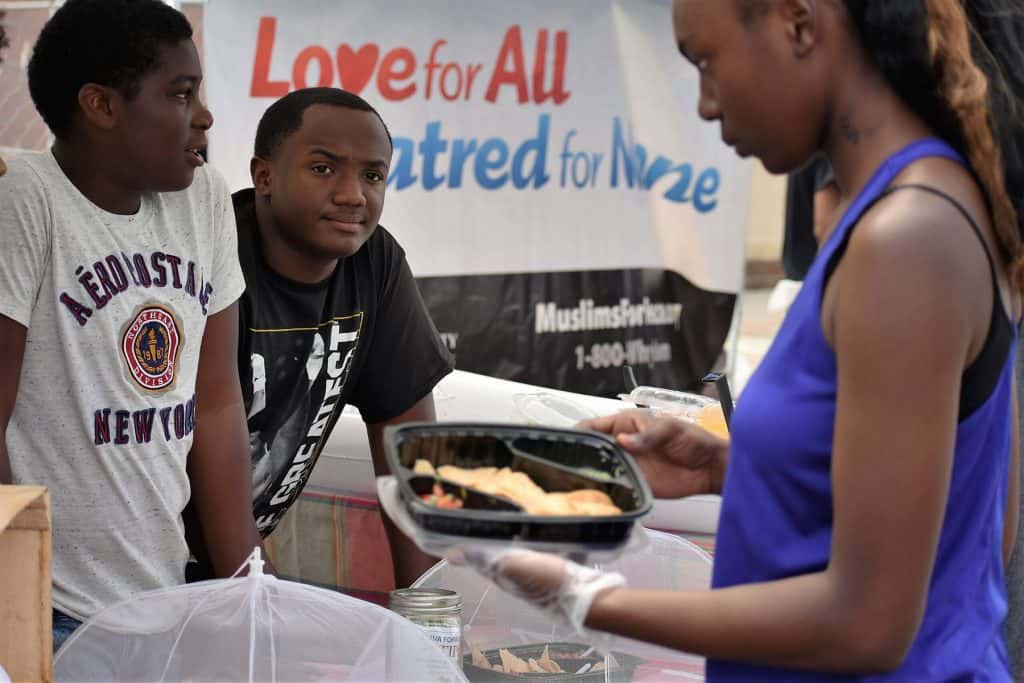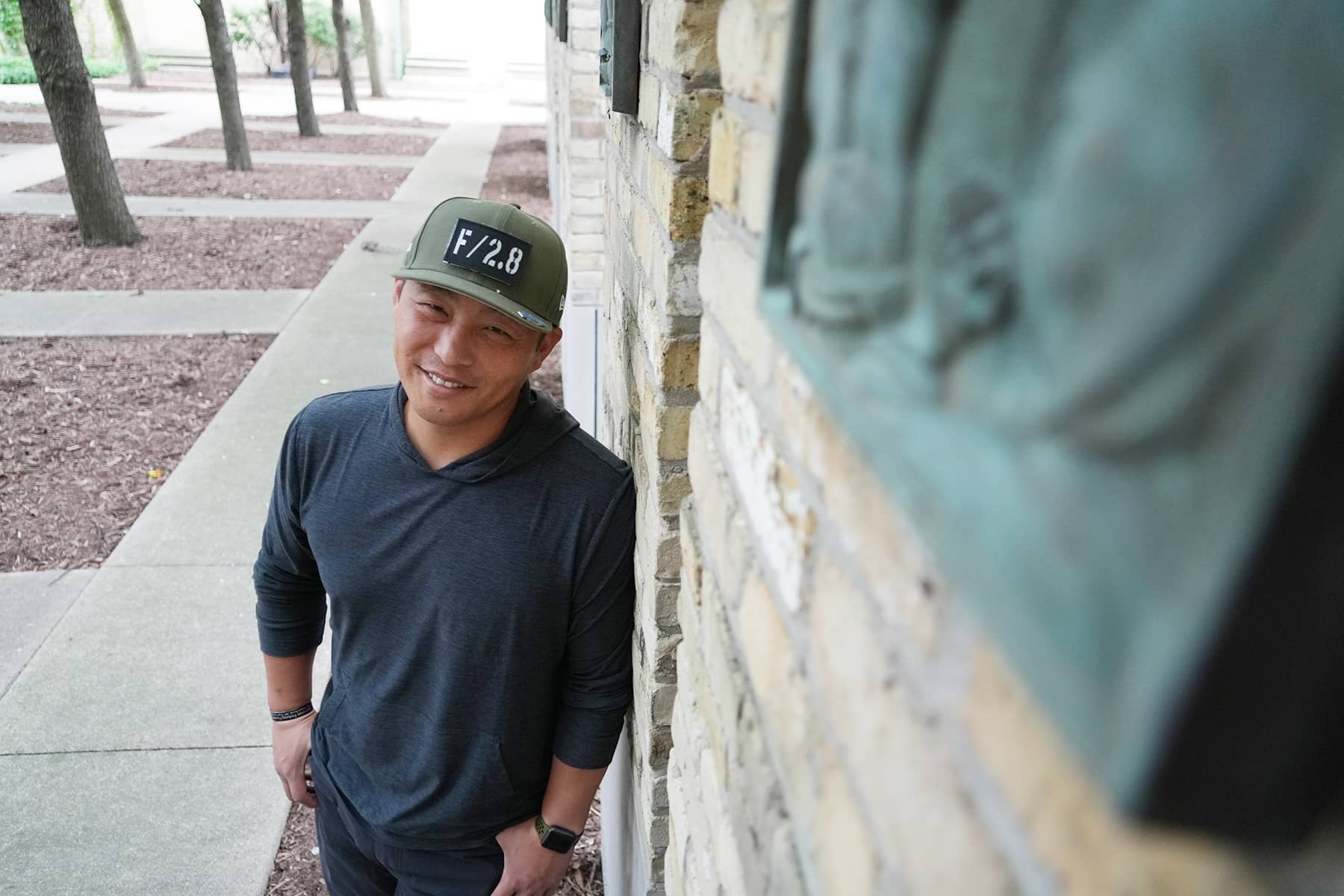
From grappling with undiagnosed dyslexia in his youth, to finding his cultural identity in an all-White community, to serving in combat in Afghanistan, to earning success as one of Wisconsin’s most respected photojournalists, the life and journey of Kenny Yoo offers insight into the experiences of a Korean-American born and raised in Milwaukee.
Yoo recalled that the environment he was raised in during his childhood lacked the nurturing he needed, and it was devoid of significant positive influences. He also admitted that he had nobody to be inspired by growing up.
“When I went home I was treated like shit because having a learning disability in the Korean culture is unheard of. So my dad just put me down,” said Yoo. “When I went to school in Brookfield, Mrs. Aicher was the only person who wouldn’t bully me. She was my learning disabilities teacher. It’s not that she was kind, she was just patient with me. And she didn’t scream at me like the other teachers or my family.”
Yoo was determined to be dyslexic in both words and numbers, but the numbers part was not discovered until later in high school. Growing up in a Korean household in Brookfield, he already faced significant cultural and social challenges. Dyslexia just added to his struggles.
While dyslexia had been understood for decades, it was not until the 1960s and 1970s that the Federal government began investing in efforts to support children with the learning disability. It would not be until the 1980s that educators and the general public had a deeper awareness of it, and the 1990s before comprehensive educational practices and policies were promoted.
“Dyslexia was still relatively new in terms of serious study back then, and students in those early classes were like guinea pigs,” said Yoo. “My dad, however, wasn’t patient at all. If I struggled to read something simple, like the word ‘apple,’ or if I hesitated, he would immediately scream at me. He called me stupid or even worse, using hurtful words in Korean. I was doing good in school, just learning at a different pace than my classmates. But my dad had a hard time accepting that as I was growing up. While he understands my situation a bit more now, it would have been a lot more helpful during my school years.”
Dyslexia is a learning disability that makes reading, writing, and spelling difficult due to how the brain processes language. It is a neurological condition, often inherited, that affects skills like decoding words and recognizing letter patterns. People with dyslexia might read slowly, struggle with spelling, and have difficulty with reading comprehension, but it does not affect intelligence. With proper support and teaching methods, individuals with dyslexia can improve their reading and writing skills.
“When I was a little kid, there was a time when I completely stopped talking right after I had just started speaking,” said Yoo. “My parents were worried and thought I might have gone deaf, so they took me to a specialist. At the playground, the specialist would call my name, and when I responded, they realized I wasn’t deaf. But they were still puzzled about why I had stopped speaking. It turned out that my brain was struggling to process both English and Korean being spoken at home. So, my parents decided to only speak English around me since we were living in the United States. Not long after, maybe a few weeks or a couple of months later, I started talking again.”
Yoo’s father also grew up in a strict household in South Korea, and also did not have fond memories of growing up. He immigrated with his family at the age of 17 to Milwaukee, where an aunt lived with her White husband.
His father graduated high school and spent a year working at a restaurant, basically washing dishes. He hated the job and decided to join the U.S. Army to facilitate his American citizenship.
Ironically, he was stationed in South Korea near the end of the Cold War, and enjoyed the military life. Going back to Korea as a U.S. soldier just a few years later allowed him to reconnect with old friends. It was also where Yoo’s parents met and were married, each at the age of 21.
When the couple returned to Milwaukee to start a family, they eventually had two sons with Yoo being the youngest by 4 years. His parents did not find it difficult to raise the boys in a foreign country. However, there was frustration about not being able to teach them Korean properly. Along with the constant financial pressure of trying to support the family.
In addition to the challenges at home, Yoo faced severe bullying at school in Brookfield. His Korean heritage and learning difficulties made him an easy target for his White classmates.
“I got beat up on the playground a lot. They would call me ‘Chinese boy’ – even though I was Korean, ‘slant eyes,’ ‘moonslits,’ ‘chink,’ ‘gook,’ you name it. I got called basically everything in the book,” said Yoo. “There is no Asian slur I haven’t been called.”
But one of the worst cruelties came in the form of American pop culture. Yoo’s family did not have cable TV at the time, so he was unable to watch Comedy Central. He was also unaware that on November 3, 1999, the network broadcast a particular episode of its popular show, “South Park.”
Yoo remained oblivious until the next day at school in Brookfield, when he was blindsided by unrelenting penis jokes. The influence of the show’s racist humor ruined his life that day, and for the decade that followed.
“South Park” is an animated television series known for its crude style of art, dark humor, satire, and irreverent take on current events, pop culture, and social issues. Created by Trey Parker and Matt Stone, the show follows four boys — Stan, Kyle, Cartman, and “Kenny” — living in the fictional town of South Park, Colorado.
Episode 11 of Season 3 was titled “Chinpokomon,” a parody of Pokémon with the “chinpo” element taken from a vulgar Japanese word for penis. The episode revolved around a Japanese toy craze that swept through South Park. When confronted by angry American adults, the Japanese toy company used a psychological ploy, telling them that American men have large penises, while Japanese men have small ones.
In the show, the tactic was part of an effort to distract Americans while the company attempted to brainwash kids. The episode satirized American consumerism, Asian stereotypes, and the influence of media on children.
But for Yoo, it opened a floodgate of penis jokes directly squarely at him.
“The second that episode came out, where they mentioned ‘we’ve got small dicks,’ was the day I started wishing Trey Parker and Matt Stone would die for what they did to me,” said Yoo. “They caused me so much grief and misery. I had to endure that stereotype for the next dozen years, because they profited from some Asian joke.”
The episode was widely praised for its “sharp parody of Japanese pop culture fads,” being described as a “devastating” satire that blended truth and high comedy. Those so-called “critics” had the luxury of their opinions, because they were all White men. They did not have to face the impact of media stereotypes that further exacerbated their racial struggles.
While not extensively documented, the South Park episode was just one of many questionable shows broadcast at the time in the United States that had a negative social impact on the Asian American community. Under the guise of humor, such programs contributed to cultural alienation. They also reinforced harmful stereotypes about Asian men, affecting their self-esteem and normalizing racism and microaggressions.
Yoo graduated high school and then earned a degree from the University of Wisconsin-River Falls. But he entered the workforce in 2008, right when the housing crisis hit the American economy so hard it threatened to trigger another Great Depression. Unable to find meaningful employment, and eager to escape from his unhealthy family environment, Yoo decided to join the military.
“I had a really tough Christmas, with criticism from family on all sorts of things, like not having a job yet. They seized on any chance they could to bully me, especially my brother,” said Yoo. “So a month later, when the snow cleared, I decided to go to the enlistment office. I wanted to do something like combat photography or PR, but they didn’t have openings. I looked at the other options and asked what would get me out of Milwaukee the fastest. The recruiter said, ‘Infantry,’ and I thought, ‘Alright, sign me up. I know it’s tough, but let’s do it.'”
At that time, the United States was in a state of war, with American troops fighting in both Afghanistan and Iraq. Yoo figured no one would want to be assigned to South Korea, so he requested the post. It was approved and he had orders to go. But while he was in basic training, President Obama gave a speech at West Point. As Yoo watched the address on a TV in the chow hall, he sensed things were about to change quickly.
“I was with another guy who was also going to Korea,” said Yoo. “I looked at him and said, ‘I don’t think we’re going to Korea.’ Obama was calling for more soldiers. The first group to go was the 101st Airborne Division and the 10th Mountain Division.”
Yoo knew that he would end up in one of the two. Fortunately, he was assigned to the 101st Airborne, which came as a relief. Based in Fort Campbell, Kentucky, it was a straight drive to Milwaukee and half the time as Fort Drum in New York where the 10th Mountain was based.
“I joined the military partly out of a desire to serve. But mostly I joined out of frustration. So maybe it wasn’t exactly the best timing,” said Yoo. “Korean Americans in general don’t look at military service as a noble or respectable career. I kind of feel like they look poorly on it.”
Joining the military in South Korea is mandatory, so there was little emphasis on patriotic duty because the service is compulsory.
“My dad was patriotic, which is why he wanted to join the military to defend America. He was very proud to serve in the U.S. Army instead of South Korea’s Army, the ROK,” said Yoo. “He was actually proud of me after I enlisted. But things had changed a lot between his generation and mine.”
The perception of military service in South Korea was more about fulfilling an obligation. So in South Korean communities, soldiers were not viewed with the same respect as in American communities. It was mandatory there, not a personal choice.
For Korean Americans, especially the generation born in the U.S., there was even less incentive to join the military. And because they did not face the same societal pressure, they could pursue higher-class jobs in the medical or legal fields.
However, that mentality also caused many in the Korean American community to look down on those who still chose to serve America by joining the U.S. military.
The 101st Airborne Division, also known as the “Screaming Eagles,” was originally formed as a paratrooper division during World War II, famous for its airborne operations. By the mid-1960s, the division transitioned from a parachute-based unit to an air assault division.
“In Air Assault, we learned to rappel out of helicopters for deployment, so we could get straight to the mission,” said Yoo. “When I first arrived, it was a shock. The atmosphere was entirely different. The heat wasn’t the biggest issue, it was the realization of the constant danger we were in. After a while, you just stop being scared. You start hoping that if something happens, it’s quick and painless. The last thing any of us wanted was to suffer and watch our lives slip away. We just wanted it to be over quickly if it came to that.”
Yoo said that his experience was just like the 2019 movie “The Outpost,” based on the 2012 non-fiction book “The Outpost: An Untold Story of American Valor” by Jake Tapper, about the Battle of Kamdesh during the War in Afghanistan.
“We were all baffled, just like in the film, about why they would position a small outpost at the base of surrounding mountains, where we were vulnerable. We were constantly under threat, with rockets frequently incoming. We had to take cover almost every few days,” said Yoo. “It became so routine that whenever someone returned from their two-week R&R, we joked it was like a curse because we’d inevitably have incoming fire that day. It was almost eerie, like they knew, but of course they didn’t.”
Yoo served in the U.S. Army for four years and decided not to re-enlist. He had already lost friends in combat, and the conditions in Afghanistan appeared to be unraveling. After his discharge, Yoo then returned to Milwaukee and faced what all veterans do, the struggle of transitioning back to civilian life.
Despite these challenges, he was determined to find his path and carve out a successful career. That came in the form of photography, which had always been one of his passions. In high school, he had joined the yearbook staff as a photographer to fit in. But it was only after his military service that he had opportunities to pursue the work seriously.
“I wanted to be a photographer because I realized how cool it was,” said Yoo. “You’re that ‘silent person’ that nobody pays attention to, which was great to me. Like when I was on the sidelines during high school football games, no one ever noticed me.”
In his high school years, while visiting a friend’s home, he saw sports photographs all over the walls. It turned out that his father worked for a local newspaper as a photographer. To Yoo, it was the first time he realized that he could get paid for doing the work he enjoyed.
But there were few universities in the state that had a major in photography. His only alternative was the journalism program at the University of Wisconsin-Milwaukee. Motivated by his creative passion, he went back to college to earn his second degree.
Studying for a major with an emphasis on literacy, while having dyslexia, posed its own set of challenges. But Yoo was able to navigate the writing-heavy courses. When Yoo graduated in 2015 and began getting photo assignments, he took pride in his craft and earned success from pure grit and hard work.
“I did some security work because, at first, I didn’t know if I was ever going to get paid as a photographer,” said Yoo. “But I knew that whatever industry I was in, I had to earn my respect. No one was going to just give it to me for showing up. I had to earn my respect in the Army, and it did not happen overnight. So I applied that to everything, and figured out what I had to do to be successful as a photographer.”
Yoo’s cultural identity as a Korean-American remained a complex part of his life, but he took pride in being a different kind of Korean. When the South Korean boy band BTS became popular in the mid-2010s, many Korean American men emulated that style to fit in.
“I enjoy Korean food, but I find it difficult to connect with Korean entertainment, like K-dramas. And I never wanted to follow the stereotype of trying to look like a K-pop star,” said Yoo. “I am Korean-American, so that meant I could enjoy being both while just being me. People know I’m Korean. But they know me as Kenny, and I’m perfectly fine with that. I have my own personality. And I have my own identity, which is not limited to being one thing or the other.”
While Yoo was never assigned to South Korea during his military career, he was finally able to visit the country of his heritage. The experience reminded him of the cultural differences, even within his family’s homeland.
“People knew I was not from Korea. They knew, by the way I was dressed, that guy is not from here. I didn’t even realize until I got stared at everywhere I went,” said Yoo. “Men were all wearing skinny jeans and bright aqua blue or hot pink sweaters or shirts. And when it rained, even just a drizzle, I didn’t have an umbrella. But everyone had an umbrella. So they looked at me like I was some crazy person who should be locked up for not having an umbrella.”
The visit made Yoo reflect on a conversation with his father, about going back to live in South Korea. His parents did occasionally visit, but they never considered moving back. They did not have good memories of Korea, so there was not much for them to miss.
“Plus, they said when they visited, it felt like nostalgia. But it was not the Korea they remembered,” said Yoo. “It’d changed so much that they sometimes felt like outsiders. Even at home in Milwaukee when they watch Korean movies or K-dramas, they feel they aren’t fully Korean anymore. But they weren’t fully American either. ‘We’re somewhere in between, in a kind of gray area,’ my dad said.”
Yoo came to accept not fitting in, a trait he picked up from his father. He also valued his individuality and refused to conform to societal expectations.
“At least I didn’t have to fake who I was, and pretend to be a ‘good Korean.’ Not that I was disrespectful, but I only showed respect to people who were nice to me,” added Yoo.
- Exploring Korea: Stories from Milwaukee to the DMZ and across a divided peninsula
- A pawn of history: How the Great Power struggle to control Korea set the stage for its civil war
- Names for Korea: The evolution of English words used for its identity from Gojoseon to Daehan Minguk
- SeonJoo So Oh: Living her dream of creating a "folded paper" bridge between Milwaukee and Korean culture
- A Cultural Bridge: Why Milwaukee needs to invest in a Museum that celebrates Korean art and history
- Korean diplomat joins Milwaukee's Korean American community in celebration of 79th Liberation Day
- John T. Chisholm: Standing guard along the volatile Korean DMZ at the end of the Cold War
- Most Dangerous Game: The golf course where U.S. soldiers play surrounded by North Korean snipers
- Triumph and Tragedy: How the 1988 Seoul Olympics became a battleground for Cold War politics
- Dan Odya: The challenges of serving at the Korean Demilitarized Zone during the Vietnam War
- The Korean Demilitarized Zone: A border between peace and war that also cuts across hearts and history
- The Korean DMZ Conflict: A forgotten "Second Chapter" of America's "Forgotten War"
- Dick Cavalco: A life shaped by service but also silence for 65 years about the Korean War
- Overshadowed by conflict: Why the Korean War still struggles for recognition and remembrance
- Wisconsin's Korean War Memorial stands as a timeless tribute to a generation of "forgotten" veterans
- Glenn Dohrmann: The extraordinary journey from an orphaned farm boy to a highly decorated hero
- The fight for Hill 266: Glenn Dohrmann recalls one of the Korean War's most fierce battles
- Frozen in time: Rare photos from a side of the Korean War that most families in Milwaukee never saw
- Jessica Boling: The emotional journey from an American adoption to reclaiming her Korean identity
- A deportation story: When South Korea was forced to confront its adoption industry's history of abuse
- South Korea faces severe population decline amid growing burdens on marriage and parenthood
- Emma Daisy Gertel: Why finding comfort with the "in-between space" as a Korean adoptee is a superpower
- The Soul of Seoul: A photographic look at the dynamic streets and urban layers of a megacity
- The Creation of Hangul: A linguistic masterpiece designed by King Sejong to increase Korean literacy
- Rick Wood: Veteran Milwaukee photojournalist reflects on his rare trip to reclusive North Korea
- Dynastic Rule: Personality cult of Kim Jong Un expands as North Koreans wear his pins to show total loyalty
- South Korea formalizes nuclear deterrent strategy with U.S. as North Korea aims to boost atomic arsenal
- Tea with Jin: A rare conversation with a North Korean defector living a happier life in Seoul
- Journalism and Statecraft: Why it is complicated for foreign press to interview a North Korean defector
- Inside North Korea’s Isolation: A decade of images show rare views of life around Pyongyang
- Karyn Althoff Roelke: How Honor Flights remind Korean War veterans that they are not forgotten
- Letters from North Korea: How Milwaukee County Historical Society preserves stories from war veterans
- A Cold War Secret: Graves discovered of Russian pilots who flew MiG jets for North Korea during Korean War
- Heechang Kang: How a Korean American pastor balances tradition and integration at church
- Faith and Heritage: A Pew Research Center's perspective on Korean American Christians in Milwaukee
- Landmark legal verdict by South Korea's top court opens the door to some rights for same-sex couples
- Kenny Yoo: How the adversities of dyslexia and the war in Afghanistan fueled his success as a photojournalist
- Walking between two worlds: The complex dynamics of code-switching among Korean Americans
- A look back at Kamala Harris in South Korea as U.S. looks ahead to more provocations by North Korea
- Jason S. Yi: Feeling at peace with the duality of being both an American and a Korean in Milwaukee
- The Zainichi experience: Second season of “Pachinko” examines the hardships of ethnic Koreans in Japan
- Shadows of History: South Korea's lingering struggle for justice over "Comfort Women"
- Christopher Michael Doll: An unexpected life in South Korea and its cross-cultural intersections
- Korea in 1895: How UW-Milwaukee's AGSL protects the historic treasures of Kim Jeong-ho and George C. Foulk
- "Ink. Brush. Paper." Exhibit: Korean Sumukhwa art highlights women’s empowerment in Milwaukee
- Christopher Wing: The cultural bonds between Milwaukee and Changwon built by brewing beer
- Halloween Crowd Crush: A solemn remembrance of the Itaewon tragedy after two years of mourning
- Forgotten Victims: How panic and paranoia led to a massacre of refugees at the No Gun Ri Bridge
- Kyoung Ae Cho: How embracing Korean heritage and uniting cultures started with her own name
- Complexities of Identity: When being from North Korea does not mean being North Korean
- A fragile peace: Tensions simmer at DMZ as North Korean soldiers cross into the South multiple times
- Byung-Il Choi: A lifelong dedication to medicine began with the kindness of U.S. soldiers to a child of war
- Restoring Harmony: South Korea's long search to reclaim its identity from Japanese occupation
- Sado gold mine gains UNESCO status after Tokyo pledges to exhibit WWII trauma of Korean laborers
- The Heartbeat of K-Pop: How Tina Melk's passion for Korean music inspired a utopia for others to share
- K-pop Revolution: The Korean cultural phenomenon that captivated a growing audience in Milwaukee
- Artifacts from BTS and LE SSERAFIM featured at Grammy Museum exhibit put K-pop fashion in the spotlight
- Hyunjoo Han: The unconventional path from a Korean village to Milwaukee’s multicultural landscape
- The Battle of Restraint: How nuclear weapons almost redefined warfare on the Korean peninsula
- Rejection of peace: Why North Korea's increasing hostility to the South was inevitable
- WonWoo Chung: Navigating life, faith, and identity between cultures in Milwaukee and Seoul
- Korean Landmarks: A visual tour of heritage sites from the Silla and Joseon Dynasties
- South Korea’s Digital Nomad Visa offers a global gateway for Milwaukee’s young professionals
- Forgotten Gando: Why the autonomous Korean territory within China remains a footnote in history
- A game of maps: How China prepared to steal Korean history to prevent reunification
- From Taiwan to Korea: When Mao Zedong shifted China’s priority amid Soviet and American pressures
- Hoyoon Min: Putting his future on hold in Milwaukee to serve in his homeland's military
- A long journey home: Robert P. Raess laid to rest in Wisconsin after being MIA in Korean War for 70 years
- Existential threats: A cost of living in Seoul comes with being in range of North Korea's artillery
- Jinseon Kim: A Seoulite's creative adventure recording the city’s legacy and allure through art
- A subway journey: Exploring Euljiro in illustrations and by foot on Line 2 with artist Jinseon Kim
- Seoul Searching: Revisiting the first film to explore the experiences of Korean adoptees and diaspora

















